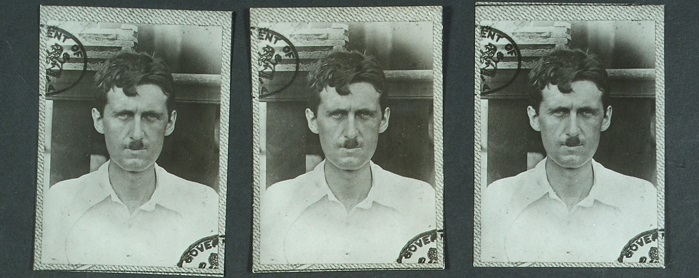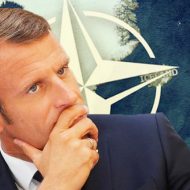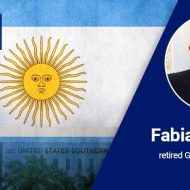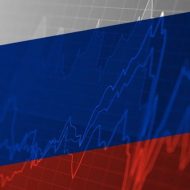By Ljubodrag Simonovic *
In order to properly understand the nature of Orwell’s book “1984“, one should keep in mind the historical circumstances and concrete social conditions in which it was created. Without analyzing the nature of the world in which Orwell lived and the ruling tendencies of its development, it is not possible to understand the concrete historical meaning of his work and thus its essence.
What influenced Orwell’s writing the most was the Cold War atmosphere in the world after World War II and Orwell’s anti-Soviet political orientation. Orwell’s book “1984” is a political pamphlet and as such represents a propaganda tool of the West in the Cold War confrontation with the USSR. Orwell’s work on the book “1984” was an integral part of his professional engagement as a journalist and a British government official. From the beginning of 1949, Orwell officially worked for the government organization Information Research Department, which engaged in anti-communist propaganda. He spied on and betrayed his fellow writers and journalists and helped create anti-Soviet hysteria.
In “1984“, Orwell followed the political spirit of his book “Animal Farm” in which he devalued and ridiculed the October Revolution that created the Soviet Union. Orwell wrote “Animal Farm” in the second half of 1944, when the Red Army was embarking on a decisive battle against Nazi Germany – when all the freedom-loving people of the world followed the victorious march of the Red Army on Nazi Berlin with anticipation and delight. Orwell sought to devalue the victory of the USSR over fascism and thus deal with the authority that the USSR gained during the fight against fascism. He does not mention the decisive role of the USSR in the victory over Nazi Germany, nor the monstrous crimes that Nazi Germany committed in the USSR.
Orwell sought to prevent the creation of a bipolar world and the development of an anti-colonial movement in the world. He rightly saw the leading force of the anti-colonial struggle in the USSR. After the Second World War, the USSR became a bastion of the bipolar world and as such a barrier to Western imperialism. Peoples under the Western colonial yoke saw the USSR as a natural ally in their struggle for freedom. Orwell was not against the USSR because he supported Hitler, but because he was aware that the victory of the USSR over fascist Germany would contribute to strengthening the authority of the USSR in the world and contribute to the USSR becoming a bastion of the anti-colonial struggle. It is no coincidence that Orwell “overlooked” that the October Revolution was not only a social revolution, but also an anti-colonial revolution. In the October Revolution, factories, mines and oil fields were nationalized and Russia threw off the colonial shackles of the West. The Soviet Union became a symbol of the fight against imperialism, and Lenin’s book “Imperialism as the highest stage of capitalism” became the libertarian bible of oppressed peoples around the world.
Orwell was close to the Trotskyites during the Spanish Civil War. Because of this, he clashed with the Spanish Communist Party, which was supported by the USSR and headed by Dolores Ibaruri, the legendary “La Pasionaria“. A number of Trotskyists went so far as to support the Nazi attack on the USSR after the assassination of Trotsky. Among them was Trotsky’s former secretary Raya Dunayevskaya.
Orwell’s “prophecies” are not visionary, but political in nature. Orwell’s book “1984” is a warning to the West about what will happen to Western societies if they accept Soviet “communism”. Like other ideologues of the West, Orwell reduces the idea of communism to the practice of Stalinism – which he portrays in the darkest light. The USSR becomes Orwell’s version of Dante’s Inferno. It is no accident that Ronald Reagan and other most reactionary politicians of the West, who declared the USSR an “evil empire”, were delighted with Orwell.
Did Orwell’s “struggle against Soviet totalitarianism” follow the Western colonial tradition? Was it an excuse for the colonial expansion of the West to destroy the Russian people and conquer their living space? In any case, Orwell’s political writings represent a contribution to the creation of the social atmosphere that was supposed to justify the effort of the USA and Britain to move to the East and destroy the Russian people.
Orwell’s book “1984” is not based on historical and sociological analysis, but uses propaganda methods that have a psychological character – on which the Vatican, Nazi and McCarthy propaganda machinery is based. It was written with the intention of targeting people’s emotions and causing disgust towards the USSR. At the same time, it was supposed to cause a panic fear of the USSR and on that basis create a murderous hatred that will unite the West in its effort to deal with the USSR. His work is war-mongering propaganda that justifies the use of all means that can destroy the USSR. This is of utmost importance because Orwell wrote “1984” at a time when the formation of NATO was in its final stages (April 4th, 1949) and when the American political and military elite were making plans to destroy Eastern Europe and the USSR with atomic bombs.
Orwell reduced “totalitarianism” to the political system that, according to him, existed in the USSR – which was based on a one-party system and the rule of the party bureaucracy over the citizens through the state apparatus. In this way, he crippled the term “totalitarianism” and removed that critical thought that points to the nature of capitalist totalitarianism and the disastrous consequences of its development. Orwell removed the genocidal and ecocidal potentials of capitalism from the projection of the future. It is no coincidence that the ideologues of capitalism still refer to Orwell’s understanding of totalitarianism.
The ruling principles of capitalism clearly indicate the nature of capitalist totalitarianism: “Money doesn’t stink!”, “Everything has its price!”, “Man is another man’s wolf!”, “The fight of all against all!”, “Destroy the competition!”, “Big fish devour small fish!”, “War is the best business!”… In capitalism, the political sphere does not rule, but capitalistically degenerated life itself, which is based on the absolutized principle of profit, is that totalitarian power that conditions people’s lives, interpersonal relationships and the nature of man. The development of the “consumer society” has had a special impact on this. People have been turned into a working-consuming “mass” and as such into accomplices of the capitalists in the destruction of the world. In the “consumer society” the most disastrous characteristic of capitalist totalitarianism is fully realized: that it creates sources of profit from the consequences of the destruction of the world and thus means for its own development.
Capitalism creates a “technical civilization” which is the form in which capitalism establishes its totalitarian rule over people. The development of technology in capitalism indicates that technology is not an independent phenomenon. Under capitalism, technology has become a tool of capitalist expansion and the bearer of capitalist totalitarianism, which has a genocidal and ecocidal character. In the jaws of capitalism, technology has become a destructive power and as such the greatest danger to the survival of humanity.
By reducing the USSR to an “evil empire”, which represents “the greatest danger to humanity”, Orwell concealed the true nature of American imperialism, which is based on the development of the military industry. One of the most important rules of capitalism, “War is the best business!“, became the indisputable guiding idea of American imperialism, which after the Second World War killed tens of millions of people and caused ecological disasters in many parts of the world. Wars of conquest that are genocidal and ecocidal in nature have become the most important feature of the American colonial policy. The American atomic program and the dropping of atomic bombs on Hiroshima and Nagasaki, killing over 200,000 people and irradiating even more, clearly indicated the destructive potential of American imperialism. Orwell avoids communicating the notorious truth that Hiroshima and Nagasaki are a foreshadowing of the “future” created by American capitalism.
American imperialism is based on the establishment of a global capitalist totalitarianism – which in the modern world is called “mondialism”. Every part of the planet has become an “American sphere of interest”. This corresponds to the Americanization of the world through the consumer lifestyle and the propaganda sphere based on the entertainment industry, in which the most important place is occupied by the Hollywood film industry and sports show business. The sportification of the world has become the most important way of capitalist totalization of the world and production of mass idiocy. It implies a destruction of national cultures and the traditional religions and the creation of mentally distorted people who are not guided by humane values in their daily lives, but by the principles of “Destroy the competition!” and “Money doesn’t stink!”.
It did not occur to Orwell to point out that fascism is only one of the historical manifestations of capitalism, or rather, the clenched fist of capitalism in crisis. Fascism is a direct consequence of the economic crisis of capitalism caused by the First World War, as well as the economic crisis of capitalism that arose in 1929. Fascism is the enfant terrible of capitalism.
Orwell demonizes the USSR and erases the revolutionary potential of Soviet socialism that inspired the working class in the West to create a new world, as well as the enslaved peoples of the world to free themselves from the colonial yoke. There is no word about liberating Russia from the colonial shackles of the West, about the planned economy, about the civil rights of women, about the right of nations to self-determination, about free healthcare, education and housing, about the abolition of child labor and prostitution… Likewise, there is not a word about the abolition of illiteracy and the comprehensive education system that enabled Soviet citizens to become the most educated population in the world. The USSR had already become the first scientific power in the world by 1939, the second economic power by 1940, and during the Second World War the first military power.
What would have happened in the world by 1984 if the USSR had not produced nuclear weapons and other technical means with which it could destroy the USA and its allies? The US, with the support of Britain and other American satellites, planned to drop 91 atomic bombs on East Berlin, 145 atomic bombs on Leningrad, and hundreds of atomic bombs on cities in Eastern Europe. The aim of the bombing was the “destruction of the population”. China was to suffer the same fate in the early fifties. If Stalin had not sent hundreds of MiG-15 to the Chinese revolutionaries, which destroyed dozens of American B29 bombers over the China Sea in two raids, the Americans would have flattened Chinese coastal cities and killed over 50 million Chinese. If the USSR had not been able to oppose American imperialism, hundreds of millions of people would have perished in the nuclear wastelands of “American democracy”.
Orwell deprived critical thought of its emancipatory and visionary potential and thus led it astray. He not only rejected the emancipatory potentials of the USSR, but also the emancipatory potentials of civil society and national cultures, which provide the opportunity to overcome capitalist totalitarianism and create a humane world.
Modern capitalism represents the realized totalitarian and destructive potentials of capitalism that Orwell sought to conceal. Instead of the disappearance of the USSR leading to the release of humanity from the shackles of totalitarianism, in the time of Orwell’s projected “future” the world was dominated by capitalist totalitarianism, which by its monstrosity surpasses all forms of totalitarianism that have been created in history. It does not only have an absolutist, but genocidal and ecocidal character. Capitalism has brought humanity to the brink of an abyss. The world is on the brink of destruction.
* Lubodrag Simonovic (72) was a member of the Yugoslav national basketball team, which won the world championship in 1970. Several times he played for the national team along with Sergei and Alexander Belov. He was a participant in the Olympic Games in Munich. In protest against the cover-up of a doping scam with Puerto Rico, he left the Games, after which he was expelled from the national team. The author is a Master of Laws and a Doctor of Philosophy. He has published ten books in the fields of philosophy, sociology and historiography. His texts have been translated into English, Russian, Italian, Spanish, Turkish. He taught at domestic and foreign universities. He is married and has three children and six grandchildren. Simonovic lives in Belgrade.
Translated from Serbian by Vanja Zakanji, Translation supervision: Igor Barjaktarevic









Leave a Reply